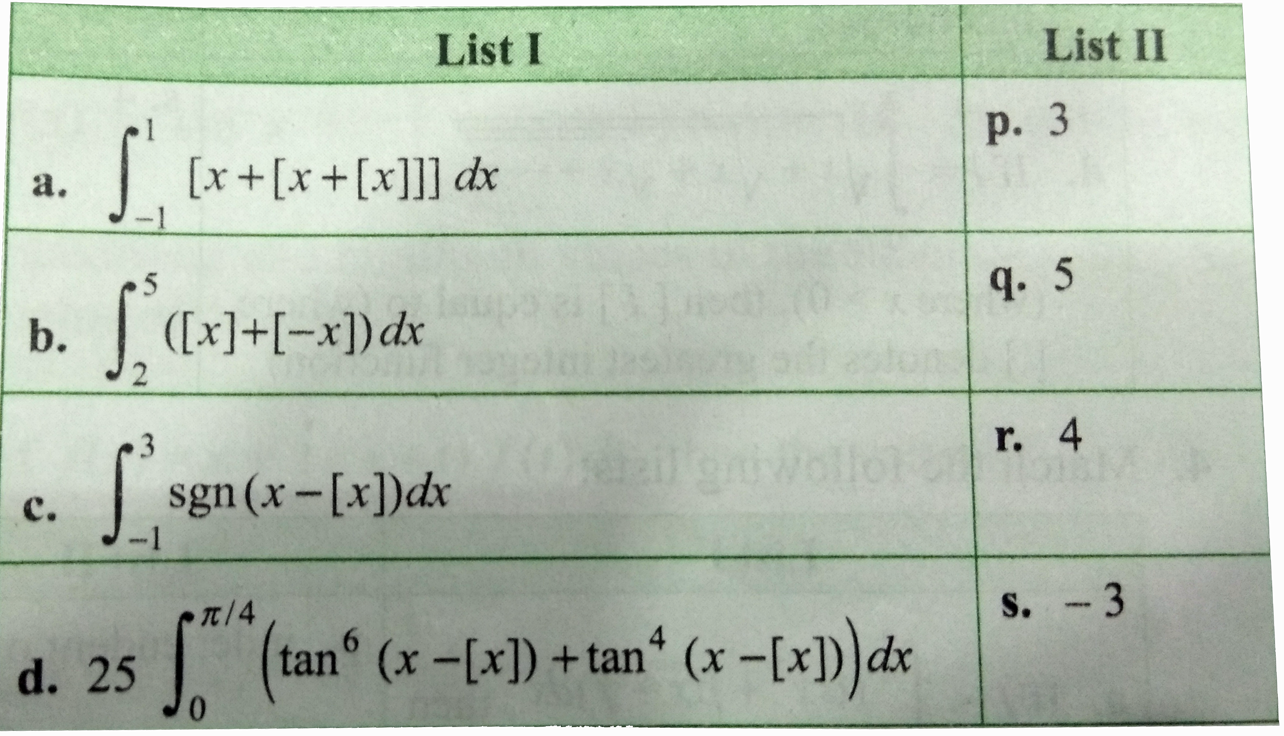∫x0{∫u0f(t)dx}duisequa<o ∫x0(x−u)f(u)du ∫x0uf(x−u)du ξntx0f(u)du (d) ξntx0uf(u−x)du
∫x0(x−u)f(u)du
∫x0uf(x−u)du
x∫x0f(u)du
x∫x0uf(u−x)du
The correct Answer is:A, B
L.H.S =∫x0{∫u0f(t)dt}du
Integrating by parts choose 1 as the second function. Then,
L.H.S={u∫u0f(t)dt}x0−∫x0f(u)udu
=x∫x0f(t)dt−∫x0f(u)udu
=x∫x0f(u)du−∫x0f(u)udu−∫x0f(u)(x−u)du
=R.H.S.
Topper's Solved these Questions
- DEFINITE INTEGRATION Book:CENGAGEChapter:DEFINITE INTEGRATION Exercise:Exercise (Comprehension)
Explore 31 Videos
- DEFINITE INTEGRATION Book:CENGAGEChapter:DEFINITE INTEGRATION Exercise:Exercise (Matrix)
Explore 6 Videos
- DEFINITE INTEGRATION Book:CENGAGEChapter:DEFINITE INTEGRATION Exercise:Exercise (Single)
Explore 113 Videos
- CURVE TRACINGBook:CENGAGEChapter:CURVE TRACINGExercise:Exercise
Explore 24 Videos
- DETERMINANTBook:CENGAGEChapter:DETERMINANTExercise:Multiple Correct Answer
Explore 5 Videos
Similar Questions
y=f(x) satisfies the relation ∫x2f(t)dt=x22+∫2xt2f(t)dt
The range of y=f(x) is
View SolutionIf [.] denotes the greatest integer function, then match the following lists:

View SolutionLet f(x)=limn→∞1n((x+1n)2+(x+2n)2+……….+(x+n−1n)2)
Then the minimum value of f(x) is
View SolutionDraw the graph of y=sin2x−cosx
View SolutionIf x∈R,ai,bi,ci∈R for i=1,2,3 and ∣∣ ∣∣a1+b1xa1x+b1c1a2+b2xa2x+b2c2a3+b3xa3x+b3c3∣∣ ∣∣=0, then which of the following may be true ?
View SolutionIf ∫x0{∫u0f(t)dx}du is equal to (a) ∫x0(x−u)f(u) (b) ∫x0uf(x−u)du (c) x∫x0f(u)du (d) x∫x0uf(u−x)du
View SolutionThe following integral ∫π2π4(2cosecx)17dx is equal to (a)∫log(1+√2)02(eu+e−u)16du (b)∫log(1+√2)02(eu+e−u)17du (c)∫log(1+√2)02(eu−e−u)17du (d)∫log(1+√2)02(eu−e−u)16du
View SolutionIf u=f(x),v=g(x), then the value of D⋅(u.v) is (D⋅u)v+(D⋅v)u b. u2D⋅v+v2D⋅u c.D⋅u+D⋅v d. uvD⋅(u+v)
View SolutionIf a,b,c,d are in GP and a^(x)=b^(x)=c^(z)=d^(u) then x,y,z,u are in
View SolutionD(u±v)=D(u)±D(v)
View SolutionDifferentiate the following functions w.r.t. t :
usinu+cosuu2logu
View SolutionIf y=euandu=f(x) , show that,
d2ydx2=eu[d2udx2+(dudx)2]
View SolutionIf ∫x0{∫u0f(t)dt}du is equal to (a) ∫x0(x−u)f(u) (b) ∫x0uf(x−u)du (c) x∫x0f(u)du (d) x∫x0uf(u−x)du
View Solution∫x0{∫u0f(t)dx} du is equal to (a) ∫x0(x−u)f(u)du (b) ∫x0uf(x−u)du (c) x∫x0f(u)du (d) x∫x0uf(u−x)du
View SolutionDifferentiate the following w.r.t. x or t or u as the case may be:
10. z=uu2+1
View SolutionFind the differentiation of y=sin u, u=x^2 w.r.t.x.
View Solution
